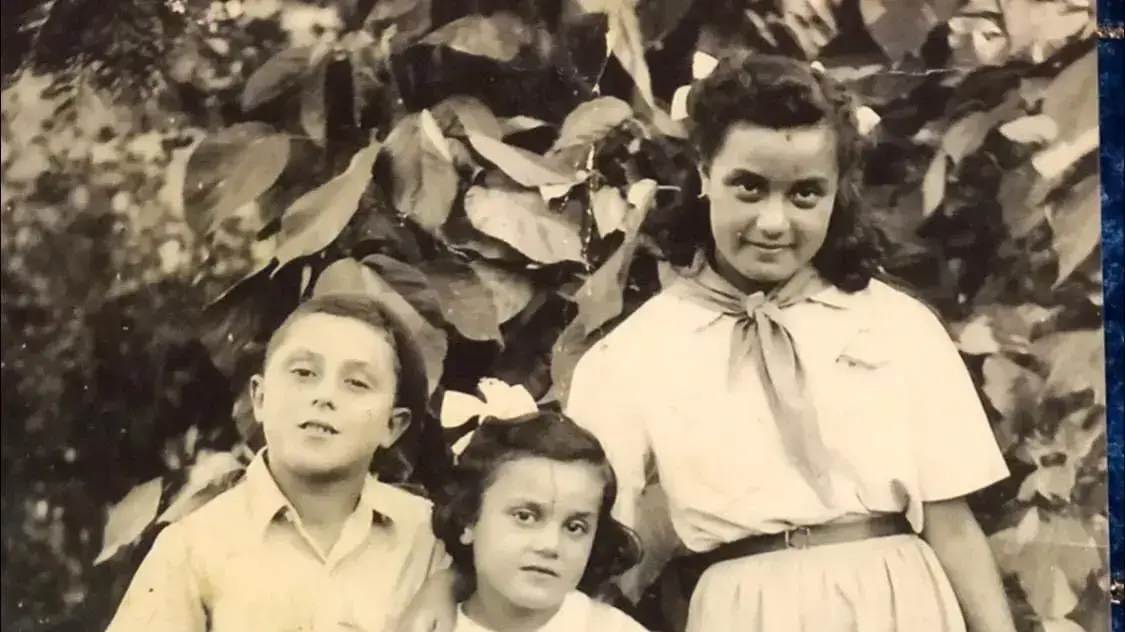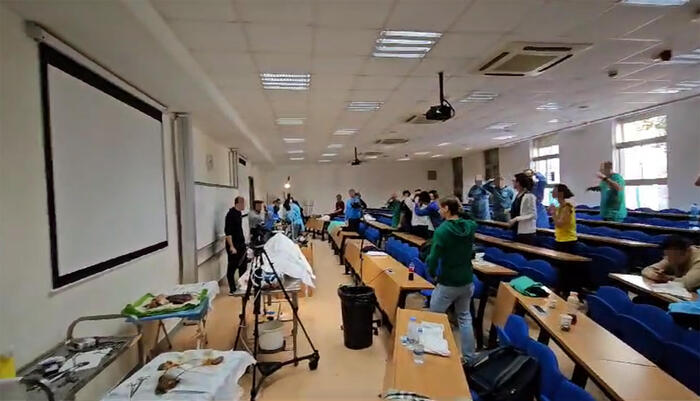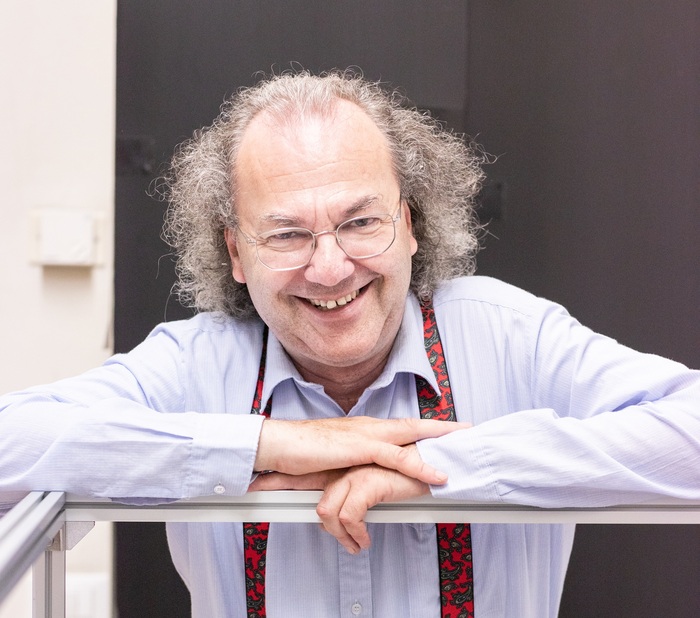marching song
Judith was indeed a well-known professor of medicine, but first and foremost a nurse
Judith Leibovich was born in Romania to a warm family, but at the outbreak of World War II her life changed and she was forced at the age of 13 to function as a mother to her two brothers.
Later she became a doctor, a cancer researcher and a lecturer in pathology, and despite offers to work abroad, she refused to give up being close to her family "she had a special bond with her brother"
Eli Ashkenazi
29/10/2022
Saturday, October 29, 2022, 09:00 Updated: 09:48
Share on Facebook
Share on WhatsApp
Share on Twitter
Share by email
Share in general
The list in its wisdom.
Judith Leibovich (photo: courtesy of the family)
After the establishment of the state, the well-known professor, Moshe Wellman, had a small and cramped laboratory in a building in the Daniel Garden in Jerusalem.
He was a world-renowned pathologist, researcher and one of the first lecturers at the Faculty of Medicine at the Hebrew University.
A young immigrant from Romania was gardening in the yard.
Wellman talked with her and she impressed him with her wisdom.
He suggested that she try working as a laboratory assistant and so it was.
Later, the same person, Judith Leibovich, will be a doctor, a cancer researcher and a pathology lecturer at the Faculty of Medicine at Tel Aviv University.
Almost a month ago, Professor Yehudit Leibovich passed away.
She was born in 1933 in the city of Fukshan in Romania to Rosa and Aharon Leibovich.
Second daughter out of four children.
Father Aaron was an expert tailor, mother Rosa - a housewife.
A traditional family, the father would go to the tailors' synagogue every Shabbat.
The Jewish community numbered about 4,000 people in a city where about 38,000 residents lived.
Many of the Jews had a Zionist consciousness, as those who grew up in the city where a congress of the "Lovers of Zion" movement was held as early as 1882.
In the home of the Leibovich family, as among the Jewish community in Fukshan, there was strictness about studies and the acquisition of an education.
For Judith the school was a significant place;
She was a gifted student, a child with a thirst for knowledge and a love of learning.
These qualities will accompany her throughout her life.
It was a warm and close-knit family that maintained good relations with its neighbors and relatives who lived in the city.
The beautiful childhood and the peaceful life were turned upside down during the Second World War;
In September 1940, a fascist government was established in Romania led by the dictator Antonescu, which collaborated with the Nazis.
More in Walla!
Panina's theater: the actress and director who created a special language in the city of Lod
The doctor fought all her life to bridge the social gap and implement egalitarian medicine
The life of the pursuer of justice: from childhood in the ghetto to her fight for equality
You won't believe what you can buy today for 10 shekels
Right: Judith, Sarah and Avraham Leibovitch, after immigrating to Israel (photo: courtesy of the family)
Soon the Jews began to suffer from severe decrees;
They were required to wear a yellow patch on their clothes, restrictions were imposed on them in purchasing food, in the middle of 1941, instructions were issued that restricted their movement to certain neighborhoods, as well as limiting the hours of shopping in the market, they were forbidden to leave the city without special permission and a curfew was imposed on them from the early evening until the next morning.
In addition, all the men aged 16-60 were imprisoned for several weeks.
After that, 65 people from among the Jewish leadership remained in prison and were forbidden to be in contact with the members of the community.
1,100 Jews were deported to Fukshan from nearby areas and the community had to provide food and lodging for them.
Many of the Jews were sent to labor camps where the living conditions were extremely difficult.
In the middle of 1944, all the Jews in Fukshan - women and men aged 15-50 - were recruited for forced labor in which they were tasked with digging trenches against tanks and repairing bridges and roads.
Judith told her family that the hardest thing for her was the fact that the Jews were forbidden to go to the schools and studies that she missed so much.
During the war, the father's business no longer supported the family and food at home was scarce.
Sometimes they received food items sent for the community from the joint organization in America.
The parents were exhausted, mentally broken and penniless.
In addition, they both had typhus.
The father, who was a happy and kind-hearted man, died towards the end of the war at the age of 45. A year later, the mother also died, aged 47.
The eldest sister, Esther, was in a forced labor camp and the 13-year-old Judith and her two younger brothers - Avraham and Sara - remained at home.
Judith was a kind of little mother to her two brothers and saw herself as responsible for them.
With the help of an acquaintance of the family, the three brothers joined the training of the Beitar movement. The members of the movement, who were graduates of them, lived as a training course whose people prepared themselves for Aliyah to Israel. They lived in their own building in Fukshan and earned a living by working in a workshop for making lanterns.
More in Walla!
Grow the valley: the man of nature and the mythological teacher who founded a settlement and contributed to generations of teenagers
To the full article
Prof. Yehudit Leibovitz on the right, with her sister Sarah (photo: courtesy of the family)
Towards the end of 1947 came the moment of immigration to Israel.
The Mossad for Aliya B brought to the port of Constanta in Romania two large and old cargo ships from the United States - "Pan York" and "Pan Crescent" which will later be called "Independence" and "Kibbutz Galyot".
After the ships were renovated, they were transferred to the port of Burgas in Bulgaria, where 15,000 Romanian Jews, a quarter of them under the age of 17, were taken in a cold and snowy winter. In Burgas, another 420 Bulgarian Jews joined.
On December 26, 1947, the ships sailed towards the shores of Israel.
In view of the British objection that the illegal immigrants would reach the shores of the country, and following the agreements reached, the ships docked on the shores of Cyprus and their passengers were taken to the detention camps in Cyprus.
Six months later, and about two months after the declaration of independence, the three younger brothers arrived, along with the rest of the immigrants to the State of Israel.
Now, for the first time in their lives, they were separated;
Judith was sent to Kibbutz Ma'gan Michael, Sara to the "Ahaba" children and youth village in Bialik village and Avraham to the "Meir Shafia" youth village.
Judith, only 14 years old, did not accept the decision.
Although working in agriculture in the kibbutz was a dream come true for her, she insisted that she should be with her sister Sarah and after a long struggle she succeeded and moved to the village of "Ava".
As in her childhood, also in her youth, she flourished in her studies and proved to be a gifted student.
After that she wanted to start studying at the university and to finance her studies she started working at various jobs such as cleaning houses and working in a laundry.
She said that on the day her first salary was paid at the laundry, she realized that the owner of the business paid her a higher salary than her co-worker.
When asked why she received a higher salary, the woman answered: "Because you are European."
Judit returned the difference on the spot and refused to accept it.
Family members and acquaintances defined her as a woman who pursues equality and justice and this story characterizes this well.
She herself defined herself as a "communist from birth" and said: "I remember that during Seder Pesach, when I was four years old, they asked me what my dream was, I answered that I would like to become a teacher and educate people for free who have no money for education."
After she got a job as a laboratory assistant in Wellman's laboratory, she began studying biology at the Hebrew University in Jerusalem.
She lived in a small kitchen of a family that housed her.
From living in poverty and overcrowding, she moved to the home of the Agron family in 1960, shortly after the mayor of Jerusalem, Gershon Agron, died.
"A friend who knew the mayor's widow said that it was difficult for her to be alone and suggested that I live with her. I was afraid that I would bring bedbugs with me to the luxurious house from where I lived," she said and added with a smile: "Suddenly I was living in a room inside a palace. The house was so big that I was afraid at night."
Prof. Yehudit Leibovitch in Paris with Simcha Tsavari (photo: courtesy of the family)
After excelling in her studies, she received a scholarship several years later and went to study at the Sorbonne in Paris.
Along with excelling in studies, she connected with French culture - music, literature, poetry, painting and more.
At that time, social unrest began in France and in Paris the student revolt broke out.
The demonstrators called for a revolution that would transform the conservative French society into a free, progressive, egalitarian and liberal one.
The students of the Sorbonne, who then called the university "the university of the people", were among the leaders of the demonstrations.
Judith herself was a member of the student council and took an active part in the demonstrations.
During her studies in the French capital, she met Simcha Tsavari, a doctoral student at the Sorbonne in Oriental Studies.
Zabri is one of the figures most associated with the Communist Party in Israel.
She was born to parents who came from Yemen after the First World War.
The family lives in dire poverty.
From a young age Zabri believed in the communist ideology and in her youth was even sent by the communist party to study in Moscow.
Later she was one of the leaders of the party in Israel.
Tsavari was twenty years older than Leibovich, and despite the age difference they were very good friends.
She told Eran Turbiner that they traveled and demonstrated together.
There was a special connection between them.
Turbiner, a filmmaker and the one who established a testimony archive of Israeli left-wing activists, has been in contact with Leibovitch for the past decade.
"She was one of my best friends. A hot woman," he defined her.
Together they would listen to songs from her large record collection and talk.
"We heard songs in French, Spanish, Italian and more. Mainly revolutionary songs," he said.
Everyone who knew her describes a kind-hearted, happy, curious, cordial woman, caring for family members and friends, with a large heart and very generous to her surroundings and equally modest to the point of asceticism in her personal life.
Ronit Nesher, Yehudit's niece, said that "at the end of her studies in France, she returned to Israel, even though she was offered a permanent position there. She loved Israel and her family. She had a special bond with her brothers and still felt responsible for them."
In the early sixties, Judith and her two brothers discovered that Esther, their eldest sister, was alive and living with her family in Romania.
The sister and her family immigrated to Israel and the four brothers were united again and have not been separated since.
She always remained the girl who protected and protected her family.
Judith with her brother Avraham (photo: courtesy of the family)
Yehudit had no children and her seven nephews and nieces she cared for as if they were her children.
"She was a worried aunt, really worried about us. If we didn't answer a phone call from her, she would get in a taxi and come to us," said niece Ronit.
"She instilled in our family a value that became the family legacy and according to which family is the most important thing. Every visit she would come with bags full of gifts."
After returning to Israel, she worked at the Hebrew University in Jerusalem, but has not yet been granted tenure.
At that time there was also a storm in the social protest led by activists of the "Black Panthers" organization.
Judit, a graduate of the demonstrations in Paris, identified with the demands of the activists, members of the second generation of Arab immigrants.
She also participated in demonstrations and was even arrested once.
She left Jerusalem and moved to Tel Aviv, after being accepted as a faculty member at the Faculty of Medicine at Tel Aviv University.
Now she once again worked alongside Professor Wollman who was then a researcher and lecturer in the Department of Pathology at Tel Aviv University.
Leibovitz was a cancer researcher and even conducted several studies together with Wellman.
The students loved her lectures and she devotedly accompanied many doctoral students.
She kept their doctoral theses at home and continued to accompany them and be in contact with them throughout the years.
She herself continued to research and update herself throughout the years and was invited to lecture at many medical conferences around the world, even after she had already passed the age of 80.
Filmmaker Dan Wellman, son of Professor Wellman, says that "Yehudit was one of the most important people in my life and in the life of our family. A kind-hearted and humble woman. She mentioned I have the lyrics of Avraham Halafi's song - 'I reduce myself to an unknown point so as not to disturb royalty.'"
Wellman also noted her thirst for knowledge and culture.
Most of her life she lived in a very small apartment with a collection of thousands of books in many languages.
Given her desire to read literature and poetry in the original language, she learned Russian, Yiddish and Italian, alongside Romanian, English and French, which she already spoke and read.
When her health weakened and she was hospitalized for medical treatments, she forbade her family members to present her as a professor of medicine and not to use this to gain good treatment from the other hospitalized patients.
"There was a time when she was lying on a bed in the corridor and we wanted to tell the team that this was someone who taught generations of doctors. She told us that we didn't dare to do that. She said that she was taught not to be proud and show off. Even when an intern would check her, she didn't correct him if he was wrong." , said niece Ronit.
In her last days, her nephews sat by her bedside.
They were like her children, and as she was a little mother to their parents, she was also a kind of grandmother to them.
They told her how much she was loved and important to them and said goodbye to the woman who, although she became a well-known medicine woman, always remained the girl who protected and looked after her family.
news
News in Israel
Events in Israel
Tags
marching song
Holocaust survivors









